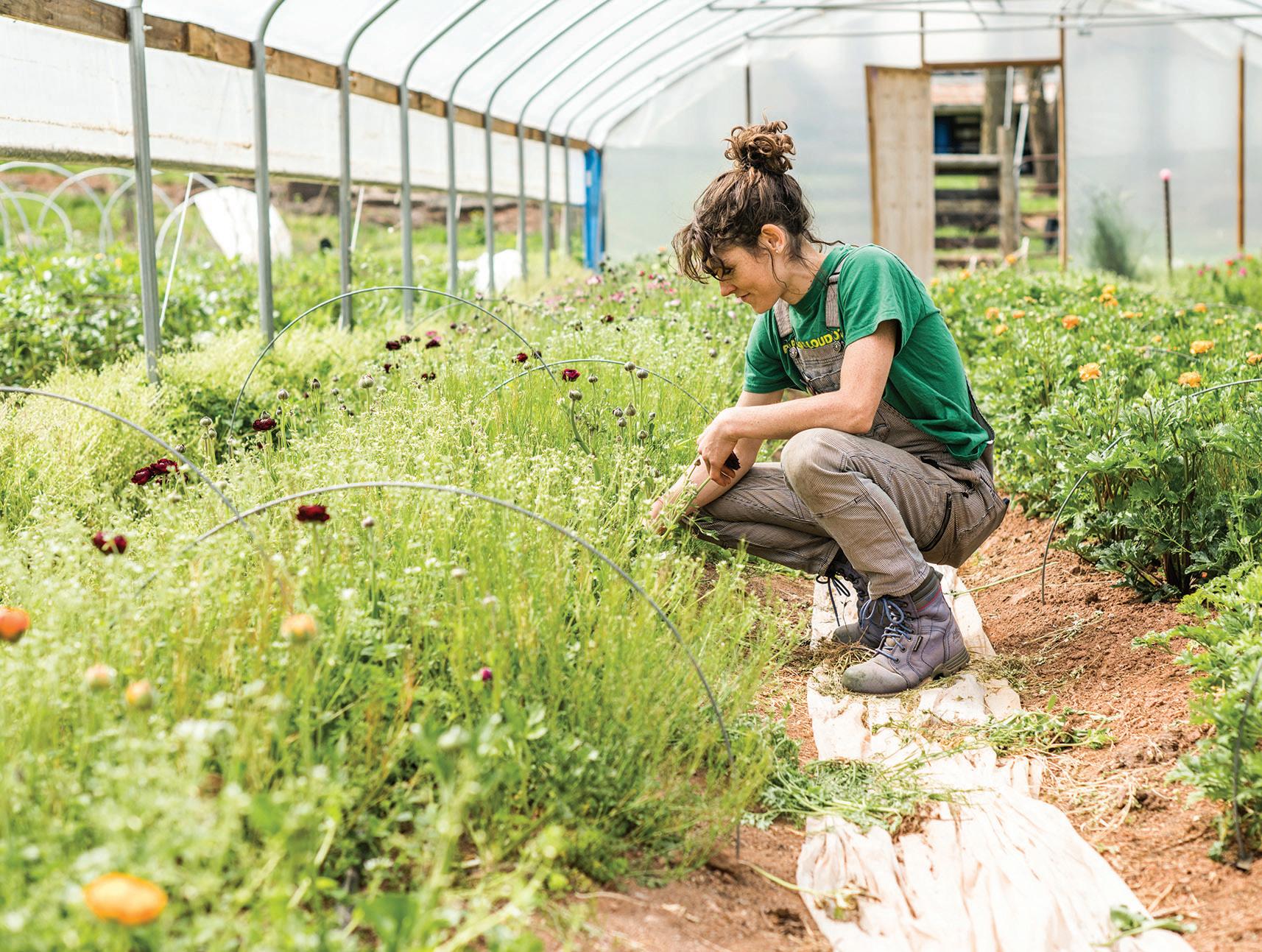
4 minute read
Far Bungalow Farm: LOCAL PEOPLE, LOCAL FLOWERS
from May 2023
Written by Kaitlin Hill | Photos by Gracie Withers
“It brings me ultimate joy to know the people that are getting my flowers,” says Sage Devlin, owner of Far Bungalow Farm in Leesburg. For Devlin, an interest in growing things came early, started locally, and always persisted through different career paths until opening Far Bungalow Farm in 2020. More than growing gorgeous flowers, Devlin’s holistic approach to the industry focuses on sustainability, education, and consumer empowerment.
A New Jersey native, Devlin developed a green thumb early during visits to their grandparents in Leesburg. “I grew up gardening with my parents; my grandma also always did a lot of gardening. So, I think I just had the bug,” Devlin shares. While school took Devlin to New York to study musical theater, growing plants remained a priority and a passion. “When I was in New York, I was growing tomatoes on my fire escape. I was always growing things,” Devlin explains. A desire for more space inspired Devlin to move to Portland, Oregon, where, in addition to working in a flower shop, they attended The Floral Design Institute. “I got into flower shops, and that was that.” Devlin continues, “I went to floral design school and was classically trained, if you will. Then I went to work for an eco-florist, and I saw the very stark difference between traditional floristry where they use microplastics, imports, and how unsustainable it is [versus] this eco-florist who bought local and didn’t use chemicals. Then, for me, the main thing became how can I be part of making floriculture a sustainable industry as a whole.”
Devlin’s desire to grow flowers full-time brought them back to Leesburg, and their grandparents’ farm. “I just decided I wanted to grow flowers. So, I was like, ‘There’s this farm. I guess I am going to move to Virginia now,’” Devlin explains. They add, “The farm that I grow on is a big, like 600-acre property that has been in my family for seven generations, I think. 200 years or something crazy like that.”
As for the name, “The larger farm is Rockland Farm, and there are all these tenant houses. My tenant house has always been called, administratively, the far bungalow. I took that and ran with it.”
For Devlin, opening at the brink of the pandemic proved to be a good thing. “I was an essential worker, agriculture was, so I could still go to work and was working outside.” They add, “[Due to] lockdown, I didn’t have any social obligations or distractions. I went all in on the farm for a year and just concentrated.”
Part of that concentration was making the operation all-encompassing and sustainable. Devlin says, “I call myself a farmer-florist. I do the growing of the flowers and also the arranging. It’s pretty holistic.” They continue, “I want it to be a closed loop operation, where the community is involved too.”

Essential to community involvement is education. “A big thing for me is education, and I am still learning who needs to be educated. Everybody does, but the consumer needs a lot of education.” Devlin continues, "The customer needs to know that not all florists are sustainable, and what to look for when trying to choose a sustainable florist." They add that “putting sustainable flowers on the map” is important as the concept is a current blind spot in the conservation conversation.
Devlin expands, "Foam free is sustainable. The use of floral foam is not. The use of bleached and dyed or painted floral material is unsustainable because it turns something compostable into something that now goes to the landfill instead. Importing all flowers so that the consumer can get whatever they want at any time of year with no regard to jet fuel emissions it takes to ship those flowers is unsustainable. Most florists have to do at least a little bit of importing for off season, but buying local flowers that are in season is best as far as sustainability and beauty, if you ask me.”
Devlin adds, “The message is local flowers, local people. If everyone buys flowers from their local provider and all the providers provide to local people, then we don’t need imports, which is great.” To achieve this arrangement, Devlin’s flowers are most often found in small businesses.

“I want to meet people where they are. Places like the Merc, mom and pop shops, small businesses, small grocery stores, cafes, community hubs have been a really strong support.”
And while they do event design and big installations, too, Devlin admits, “My floral dream would be to have a retail flower shop that is affiliated with the farm, where I can stock locally grown flowers.” They add, “Those little daily ar- rangements, that’s my favorite thing.”
Devlin’s flower philosophy and focus on local even goes one step further, literally into consumers’ backyards. “I would like to empower people to grow a garden if you can. If you want to source beautiful ranunculus from your local farmer, great! But then go out and pick daisies from your own yard, add those to a bouquet and drop them off at your neighbor’s house.” They conclude, “To me, that is the dream floral economy.”

Devlin’s passion for local flowers and adamant focus on sustainability give new meaning to Lady Bird Johnson’s adage that “Where flowers bloom, so does hope.” At just 33, Devlin is injecting the local industry with a new energy that defies traditional practices and aims to leave a place better than they found it. Devlin says, “My hope is that people will start paying more attention to where their flowers come from.” ML



TARA TROUT
Partner, Farm & Equine, Private Client Specialist tara.trout@ahtins.com

703.737.2244

ROB RENNER
Partner, Private Client Specialist rob.renner@ahtins.com


703.737.2206










